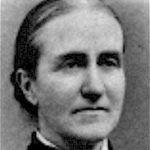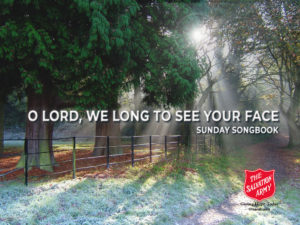Beneath the cross of Jesus
I fain would take my stand –
The shadow of a mighty rock
Within a weary land,
A home within the wilderness,
A rest upon the way,
From the burning of the noontide heat
And the burden of the day.
Upon that cross of Jesus
Mine eye at times can see
The very dying form of one
Who suffered there for me;
And from my smitten heart, with tears,
Two wonders I confess:
The wonder of His glorious love,
And my own worthlessness.
I take, O cross, thy shadow
For my abiding place;
I ask no other sunshine than
The sunshine of His face;
Content to let the world go by,
To know no gain nor loss,
My sinful self my only shame,
My glory all the cross.
This weekend brings us to Palm Sunday, but Good Friday soon follows, so we will continue to focus here on the cross of Jesus Christ. May we all find rest in its shadow, and sunshine in the face of Jesus, as the author, Elizabeth Clephane did.
 Elizabeth was born in Edinburgh, Scotland, as a daughter of the Sheriff of Fife. She was known to have been a quiet, shy child, spending much time with books. She was popular at school, where she excelled at her studies and had a great love of poetry. When both her parents died while Elizabeth was young, she learned to deal with sorrow. She became known to others, particularly those who were sick or suffering, as “My Sunbeam”. Apparently the lines about sunshine in the above hymn were her own reference to this.
Elizabeth was born in Edinburgh, Scotland, as a daughter of the Sheriff of Fife. She was known to have been a quiet, shy child, spending much time with books. She was popular at school, where she excelled at her studies and had a great love of poetry. When both her parents died while Elizabeth was young, she learned to deal with sorrow. She became known to others, particularly those who were sick or suffering, as “My Sunbeam”. Apparently the lines about sunshine in the above hymn were her own reference to this.
The hymn was written as a poem and published with others by Clephane in a Scottish magazine. Ira Sankey, the evangelist, discovered it there and wrote the original tune, which is now usually replaced by the more familiar one by Frederick Maker. When the hymn was first sung, as a solo by Ira Sankey, prior to a message by Reverend W.H. Aitkin, the listeners were so visibly moved that the Reverend changed his sermon topic to “The Cross of Jesus”. This and “The Ninety and Nine” were the only hymns Elizabeth Clephane ever wrote.
This and “The Ninety and Nine” were the only hymns Elizabeth Clephane ever wrote. Share on XWORDS: ELIZABETH CLEPHANE MUSIC: FREDERICK MAKER OR IRA SANKEY
S.A. SONG BOOK, 1987 EDITION, #476 AND #989; 2015 EDITION, #161
REFERENCE: MORGAN, ROBERT J., THEN SINGS MY SOUL, BOOK 2






